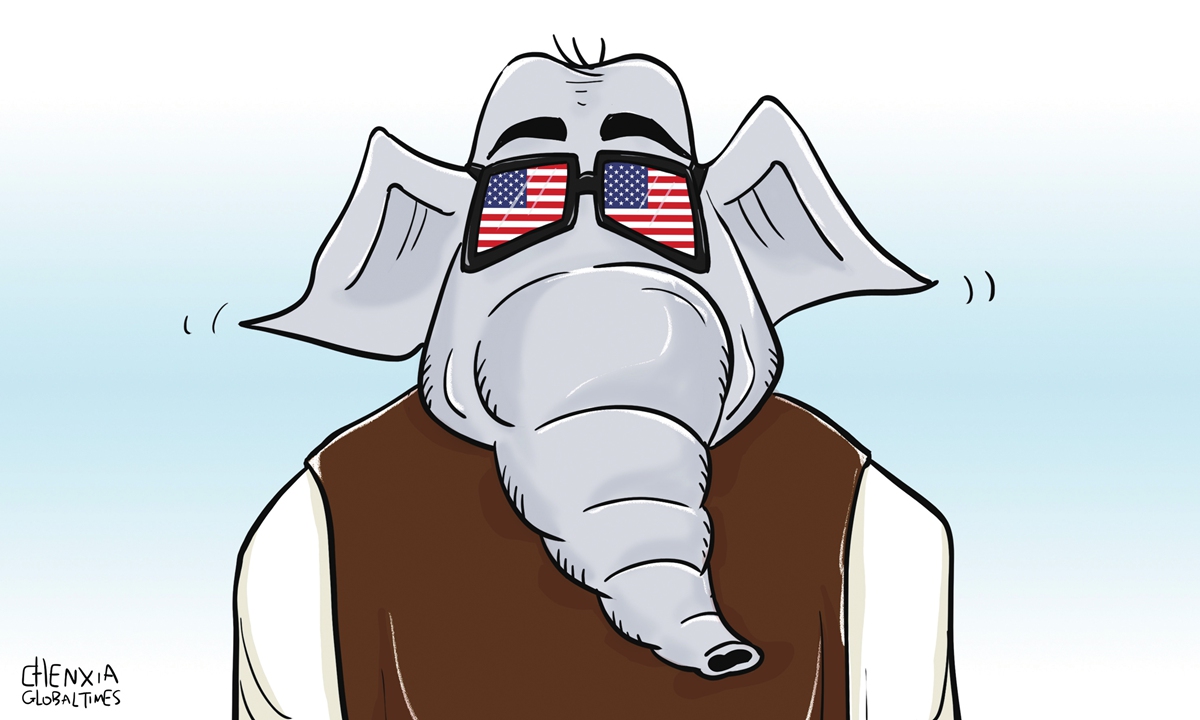New Delhi will only hurt itself following Washington's lead to de-Sinicize its economy

India-US relations Illustration: Chen Xia/GT
Recently, India has escalated its crackdown on Chinese companies. In June, the Indian government forcefully demanded that companies such as Xiaomi and OPPO appoint Indian nationals as their CEOs, COOs, CFOs, CTOs, and other key positions in their Indian manufacturing units. Additionally, the enforcement agency under the Indian Ministry of Finance in 2022 directly issued a fine of approximately 4.8 billion yuan ($725 million) to Xiaomi's Indian subsidiary. Since 2020, India has banned hundreds of Chinese applications, displaying a strong stance of economic "de-Sinicization."During his meeting with Indian External Affairs Minister Subrahmanyam Jaishankar in Indonesia on Friday, Wang Yi, a member of the Political Bureau of the Communist Party of China (CPC) Central Committee and director of the Office of the Foreign Affairs Commission of the CPC Central Committee, urged India to provide a fair, transparent and non-discriminatory business environment for Chinese companies.
Why is India suppressing Chinese companies?
India's suppression of Chinese enterprises against the laws of economics is a narrow economic calculation of "overtaking China." China is a major global manufacturing country, and India's industry cannot make progress without made-in-China. Over the years, India has imported a large number products and components from China. This effectively reduces the production costs of Indian companies, improves production efficiency, increases the global competitiveness of Indian products, and drives India's exports to European and American countries.
At the same time, Chinese companies, represented by the smart phone industry, have invested in India in recent years, which has boosted employment in the region and improved the quality of the workforce. This complementary cooperation structure between China and India conforms to the overall laws of economic development under economic globalization.
However, India ignores its current situation of lagging far behind countries and regions such as China, the US, Europe, and Japan in the field of digital economic development. India is trying to accelerate catching up with China in key technology areas such as cell phones and promote the digital transformation of the economy. Ultimately, they want to squeeze out China's position in the smart phone industry chain. In contrast, the outside world generally does not hold India's ambitions in high regard.
India's motivation appears to be politically driven. The year 2024 is an election year in India. The ruling Bharatiya Janata Party (BJP) is eager to win a third term. The BJP continues to wave the flag of nationalism, attempting to play the "anti-China" security card to rally support. In fact, as the world's two largest developing countries and eternal neighbors, China and India clearly have more common interests than differences. China has always viewed and handled the China-India relationship from a strategic and long-term perspective. Even in times of difficulty, China's position has never wavered. India should reciprocate and find a mutually acceptable solution to the border issue rather than letting specific problems define the overall relationship.
Moreover, India's suppression of Chinese companies through unconventional means is also due to India's misguided judgment of the current international situation. India believes that since it has become the fifth largest economy in the world with its GDP rising, it is experiencing its "moment of glory." At the same time, the US mistakenly views China as its main competitor and the most significant geopolitical challenge and continues to increase its support for India while suppressing China. Recently, the US has tolerated and accommodated many of India's actions in the international political arena, using India to contain and consume China. This judgment has been further strengthened after Indian Prime Minister Narendra Modi's recent visit to the US in June. India believes that it can use the US' Indo-Pacific Strategy to contain China while deepening cooperation with the US. This has also become an important reason why India is at the forefront of suppressing Chinese companies. India's plan to use the US to suppress China may not be as easy as it seems.
The US and Western anti-China forces, confident that some of their industries are in the upper reaches of the industrial chain, and holding the cards of high technology and capital operation, want to "decouple" from China. But for India, which is in the downstream of the industrial chain and relies heavily on made-in-China in the area of production and consumption, this is unreasonable. India should realize that its imports from China only account for 3 percent of China's total exports, and the losses caused are well within China's capacity to bear, which cannot suppress or harm the Chinese economy. However, if India continues to act arbitrarily, they will erode China's confidence in the development of relations between the two countries.
The author is director of the research department at the National Strategy Institute at Tsinghua University. opinion@globaltimes.com.cn


